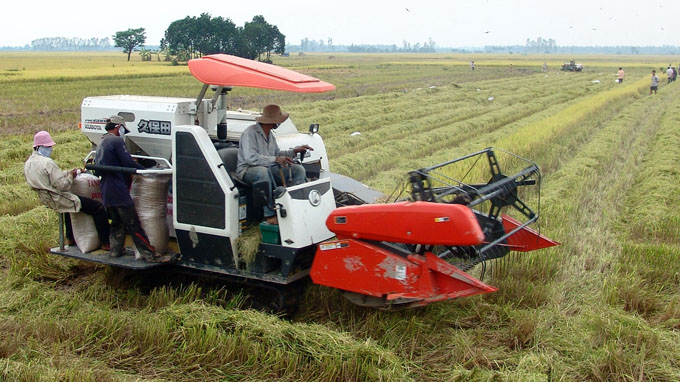Besides strongly supporting rice growers with seeds, fertilizers and modern cultivation practices, a multi-sector agricultural company in the Mekong Delta province of An Giang also launched a special program to allow farmers to be its shareholders.
An Giang Plant Protection Service JSC (AGPPS) has officially implemented its plan to issue 2.48 million shares at preferential prices for farmers in the Mekong Delta.
Some 6,000 farmers who are participating in a rice growing program run by AGPPS will be allowed to buy the shares at VND30,000 each, half of the real rate.
“By buying AGPPS shares, these farmers will become the shareholders and new owners of the company, which will enable them to benefit more from its production chain value,” AGPPS chairman and CEO Huynh Van Thon told Tuoi Tre.
With a total registered capital of VND621 billion and more than 3,000 employees, AGPPS is currently the leading producer and supplier of plant seeders and pesticides, and one of the top rice processors and exporters of the country.
In 2010, AGPPS launched a modern rice growing program called “model large rice field,” in which it provided farmers with seeders, fertilizers, and pesticides at a zero interest rate and promised to buy all of their harvest at market rates.
Hopes and concerns
Chairman Thon said one of the benefits of the farmer-shareholder program is that farmers will be more responsible in their production.
“This will be a good condition to produce high-quality rice to meet all strict requirements of the export market, and increase value for Vietnamese rice,” he said.
Thon said farmers’ shallow pockets will not affect the plan.
“Farmers are the main factors of the production chain, as they determine the rice quality, so they play a crucial and decisive role in the success or failure of the company,” he explained.
Meanwhile, the future shareholders have their own worries.
Le Thi Hoa, a rice grower in Can Tho, said her family is happy to be eligible to buy AGPPS shares.
Still, Hoa is wondering if VND30,000 per share is really a cheap price considering the current state of the stock market, she said.
AGPPS has been paying 30 percent dividend over the last few years, but Hoa wanted to know if bank deposits could bring in bigger profits than that.
“Some farmers intend to borrow bank loans to buy the shares and I think the profit will be marginal if they do so,” she said.
Hoa added that another worry is that AGPPS is still listed as unofficial.
“What if the shares slump when the company has officially gone public?” she said.



















































